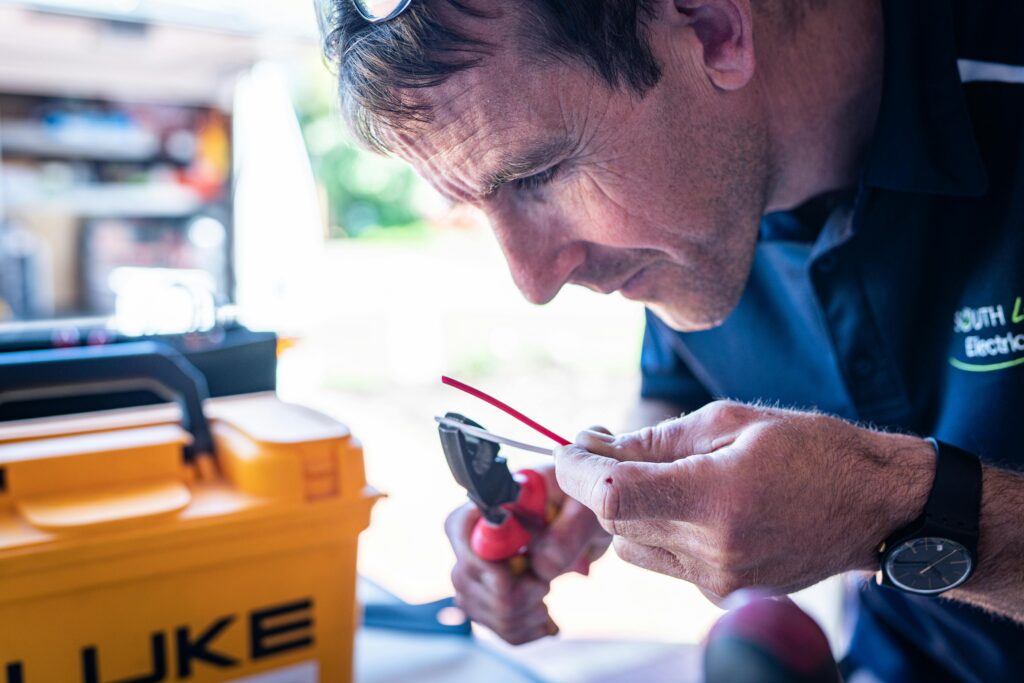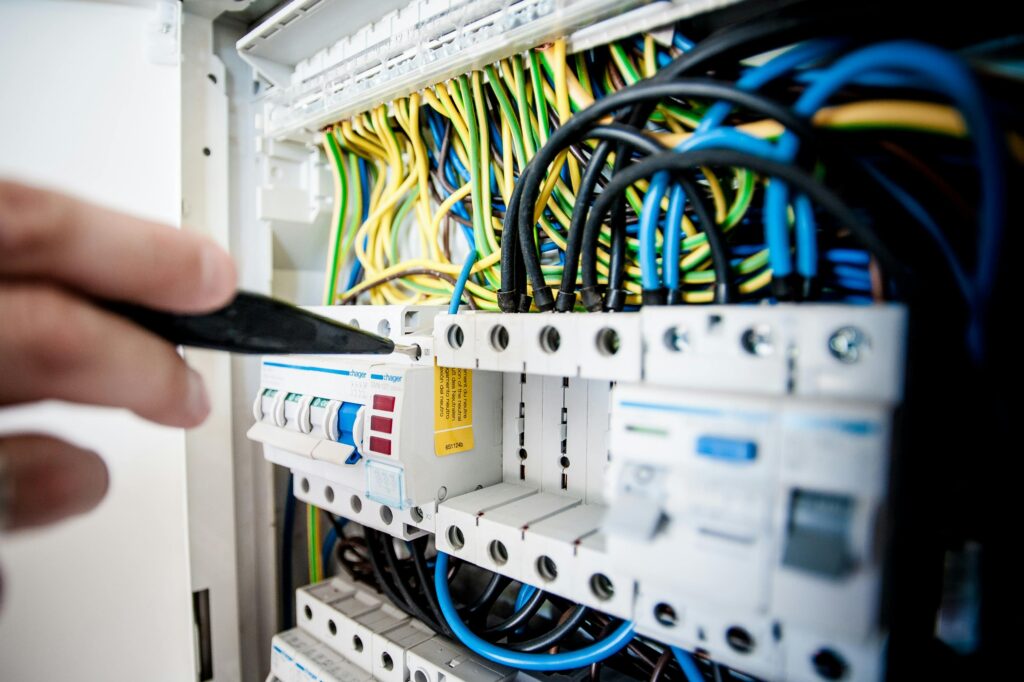Introduction
Starting an electrical contracting business in the U.S. can feel like trying to wire a whole building with the lights off.
I get it. You’ve got the skills to fix a blown panel or wire a house blindfolded. But no one taught you how to chase permits, manage payroll, or pick the right insurance to keep your butt covered when things go sideways.
If you’re like most electricians I’ve met, you’re not afraid of hard work—you just want a clear path forward. Maybe you’re ready to break free and run your own show. Or maybe you’ve been tossing the idea around, but all the red tape has your head spinning.
Here’s the truth:
Starting your own electrical contracting business doesn’t have to be overwhelming.
In this guide, I’ll walk you through:
- What you actually need to get started
- The licenses and paperwork (without the legal mumbo jumbo)
- The real costs—and how to budget smart
- And yep, the insurance you’ll wish you had if anything ever goes wrong
This isn’t theory. This is real-world, no-fluff advice from someone who’s been there.
So grab a coffee (or a cold one), let’s break it down step-by-step and get you wired for success.
What Exactly Does an Electrical Contractor Do?
Let’s get one thing straight: being a skilled electrician and running an electrical contracting business are two completely different ballgames.
Sure, the tools might look the same. The jobs might even sound similar. But trust me, when you go from wiring up homes to running your own show, everything changes.
Think of it like this:
Being an electrician is like being the chef in someone else’s kitchen.
Running an electrical contracting business? You’re the one who bought the restaurant, hired the staff, handles the health inspections, and deals with the guy who delivers the meat three hours late.
Here’s the difference in plain English:
- An electrician works hands-on—wiring outlets, fixing circuits, swapping panels.
- An electrical contractor runs the business side of it all—pulling permits, pricing jobs, managing teams, keeping up with safety codes, and making sure everyone on the crew gets paid (and doesn’t fry themselves in the process).
Let me paint a real-world picture:
A big apartment project breaks ground in, let’s say, Houston. The electrical contracting business on that job is the one bidding the project, setting timelines, managing the site’s temp power, and coordinating electricians to rough-in each unit. If something fails inspection? That’s not just a delay—it’s the contractor’s butt (and bank account) on the line.
And here’s the kicker most people don’t think about:
When you start your own electrical contracting business, you’re not just changing job titles, you’re stepping into full legal responsibility.
That means:
- Carrying insurance (yep, the kind that actually covers you)
- Following OSHA rules to the letter
- Making sure your crew is licensed and trained
- And yes, having the right license yourself—because in most states, being a licensed electrician alone doesn’t cut it.
You’ll likely need to:
- Pass business and law exams
- Show proof of experience (usually 4–5 years)
- Post a surety bond (think of it as a promise to finish what you start)
So no, the leap from electrician to contractor isn’t a tiny step—it’s more like a jump across a canyon. But if you’ve got the guts, the grit, and the brains to match your hands, starting an electrical contracting business can change your life.
It’s not just about pulling wire. It’s about building something that’s yours.
Stick with me—next, we’ll tackle how to get licensed and make your business legit from day one.

Licensing Requirements for Starting an Electrical Contracting Business
When you’re starting an electrical contracting business, understanding the licensing requirements is crucial. These requirements vary by state, and it’s essential to comply with them to operate legally and avoid penalties.
An electrical contractor license allows you to bid on projects, hire electricians, and ensure that all electrical work complies with local codes and standards. Obtaining this license typically involves meeting specific education and experience requirements, passing examinations, and securing the necessary insurance and bonds.
State-by-State Licensing Requirements for Electrical Contractors
Below is a summary of licensing requirements for starting an electrical contracting business in select states:
California
- License Type: C-10 Electrical Contractor
- Requirements:
- At least four years of journey-level experience within the past ten years
- Pass the Law and Business exam and the trade exam
- Obtain a $15,000 contractor bond
- Provide proof of workers’ compensation insurance
- Governing Body: Contractors State License Board (CSLB)
Texas
- License Type: Electrical Contractor License
- Requirements:
- Employ a licensed master electrician
- Register with the Texas Department of Licensing and Regulation (TDLR)
- Provide proof of insurance
- Governing Body: Texas Department of Licensing and Regulation
Florida
- License Type: Certified Electrical Contractor
- Requirements:
- Four years of experience
- Pass the state certification exam
- Provide proof of financial stability and insurance
- Governing Body: Florida Department of Business and Professional Regulation
New York
- License Type: Varies by city and county
- Requirements:
- Requirements differ across municipalities
- Typically involve experience, exams, and insurance
- Governing Body: Local licensing authorities
Steps to Obtain Your Electrical Contractor License
- Gain Experience: Accumulate the required years of experience as specified by your state.
- Education: Complete any necessary educational programs or apprenticeships.
- Pass Exams: Successfully pass the required trade and business law examinations.
- Secure Insurance and Bonds: Obtain general liability insurance and any required bonds.
- Apply for License: Submit your application along with the necessary documentation and fees to the appropriate governing body.
For a comprehensive overview of licensing requirements in all 50 states, you can refer to this state-by-state guide.
Understanding and complying with your state’s licensing requirements is a foundational step in starting an electrical contracting business. It not only ensures legal operation but also builds trust with clients and positions your business for success.

How Much Does Starting an Electrical Contracting Business Cost?
It’s important to understand the financial commitments involved before starting an electrical contracting business in order to avoid unpleasant surprises.
Here’s a detailed breakdown of the key startup costs you should anticipate:
1. Licensing Fees
Before you can legally operate, you’ll need to get the right licenses and licence fees can vary depending on your location and the type of work you plan to do.
- State Electrical Contractor License: Typically ranges from $100 to $1,000. For instance, in California, the application fee for a C-10 Electrical Contractor license is around $300, with additional costs for exams and fingerprinting.
- Local Business License: Expect to pay between $50 and $500, depending on your city or county requirements.
- Specialized Permits: If you plan to offer specialized services, such as low-voltage installations, additional permits may cost between $100 and $1,000.
- Continuing Education and Renewal Fees: To maintain your license, you’ll need to complete continuing education courses, which can cost $100 to $300 annually.
Failing to get the proper licenses can result in fines and project delays, so it’s very important to factor these costs into your startup budget.
2. Insurance Premiums
Insurance is not just a legal requirement in many states; it’s a critical safeguard for your business.
- General Liability Insurance: Covers third-party bodily injury and property damage. Electricians pay an average of $57 per month, or $684 per year.
- Workers’ Compensation Insurance: If you have employees, this is mandatory in most states. The average cost is $217 per month, or $2,602 annually.
- Commercial Auto Insurance: If you use a vehicle for work purposes, this insurance averages $140 per month, or $1,682 per year.
- Tools and Equipment Insurance: Protects your tools from theft or damage. The average cost is $41 per month, or $494 annually.
- Professional Liability Insurance: Covers claims of negligence or faulty work. The average premium is $74 per month, or $886 per year.
Without the right insurance, you risk significant financial loss. For example, a contractor in Texas faced a $75,000 lawsuit after a faulty panel installation caused a fire. Without insurance, he had to cover the costs out of pocket, leading to severe financial strain.
3. Equipment Costs
Investing in quality tools and equipment is essential for efficiency and safety.
- Basic Toolkit: Includes items like insulated screwdrivers, pliers, and voltage testers. Expect to spend between $100 and $500.
- Advanced Tools: High-end diagnostic tools and safety equipment can range from $2,000 to $7,000.
- Maintenance and Calibration: Ongoing costs for maintaining and calibrating your equipment can add an extra 8% to 15% over the equipment’s lifespan. Business Plan Kit
Investing in reliable tools not only improves job performance but also reduces the risk of accidents and equipment failure.
4. Hidden Costs
Several additional expenses can catch new business owners off guard:
- Bonding: Many clients require a surety bond before starting a project. Costs typically range from $100 to $500 per year.
- Vehicle Purchase or Leasing: A reliable work vehicle is crucial. Purchasing a new van can cost between $25,000 and $50,000, while leasing options may be more affordable upfront.
- Vehicle Customization: Outfitting your vehicle with storage solutions and equipment racks can add an additional $2,000 to $5,000.
- Permits and Inspection Fees: Each job may require specific permits, costing between $50 and $300, depending on the project’s scope and location.
These hidden costs can add up quickly, so it’s important to include them in your financial planning.
Estimated Startup Cost Breakdown
| Expense Category | Estimated Cost Range |
|---|---|
| Licensing Fees | $500 – $2,500 |
| Insurance Premiums | $2,000 – $5,000/year |
| Equipment and Tools | $2,000 – $10,000 |
| Bonding | $100 – $500/year |
| Vehicle Purchase/Leasing | $25,000 – $50,000 |
| Vehicle Customization | $2,000 – $5,000 |
| Permits and Inspection Fees | $50 – $300 per project |
| Total Estimated Startup | $31,650 – $73,300+ |
For more detailed information on licensing requirements in your state, visit the National Electrical Contractors Association Licensing Info.

Why Business Insurance Matters When Starting an Electrical Contracting Business
Let’s be real for a second, insurance isn’t exactly the most exciting part of running your own electrical business. But it’s one of the most important. I’ve seen great electricians lose everything over one unexpected accident they weren’t insured for.
So if you’re starting an electrical contracting business, having the right business insurance for electrical contractors is not a luxury, it’s survival.
Real Talk: What Could Go Wrong?
Imagine this:
- You wire up a new panel in a client’s home. Two weeks later, a fire breaks out. Even if it wasn’t your fault, the client sues you for damages.
- Your apprentice trips over a toolbox on-site and breaks their leg. Now you’re responsible for their medical bills and lost wages.
- Someone rear-ends your work van while you’re driving to a job. The van is totaled, tools are damaged, and you can’t work for a week.
These aren’t scare tactics, they happen all the time. Without proper insurance, every one of those situations could wipe you out financially.
The Main Types of Insurance You Need (And What They Actually Cover)
Here’s a breakdown of the must-haves and what they actually protect you from:
| Insurance Type | What It Covers | Average Cost |
|---|---|---|
| General Liability | Injuries or property damage you cause to someone else (like damaging a client’s walls while drilling). | $57/month (avg) |
| Professional Liability | Mistakes in your work—like a faulty installation that leads to fire or injury. | $74/month (avg) |
| Workers’ Comp | Covers your employees if they get hurt on the job—pays for medical bills and lost wages. | $217/month (avg) |
| Commercial Auto | Your work van and tools inside if there’s an accident or theft. | $140/month (avg) |
| Tools & Equipment | Covers theft or damage of your gear, even off-site. | $41/month (avg) |
💡 These are just averages. Your rates will depend on your state, business size, claims history, and more. Get a quote tailored to your business.
📚 Learn more in our full Guide to Business Insurance for Electrical Contractors.
Let’s Make It Simple: What Do You Actually Need When Starting Out?
If you’re just getting your business off the ground, start with these 3 essentials:
- General Liability Insurance – Required by most clients and often by law. Don’t skip it.
- Commercial Auto Insurance – If you use a work truck or van, this is non-negotiable.
- Tools & Equipment Insurance – Your tools = your business. Protect them.
Then, as you grow and hire staff:
- Workers’ Compensation – Legally required in most states if you have even one employee.
- Professional Liability – Critical if you’re working on complex jobs, especially commercial or industrial projects.
What Happens If You Don’t Have Insurance?
Here’s a true story:
James, a solo electrician from Ohio, was doing a simple breaker box upgrade for a residential client. Two days later, a small fire started near the panel. The homeowner claimed it was James’s wiring and sued for $40,000 in damages. James had no professional liability coverage, so he had to cover legal fees and the settlement himself. That mistake ended his business.
Don’t be like James.
Insurance = Confidence
Having insurance doesn’t just protect your wallet—it gives you peace of mind.
It tells clients you’re a pro who takes your work seriously. It opens the door to bigger contracts, and it means you can focus on doing great work without the constant fear of, “What if something goes wrong?”
Final Tip: Don’t Just Get the Cheapest Policy
Cheaper isn’t always better. Read the fine print. Some policies may not cover subcontractors, theft from job sites, or even basic tools. Work with a broker who understands trades like ours. They can explain things in plain English and get you what you need.
💬 Want to explore what insurance coverage really costs? Get the full breakdown of insurance options and average premiums here.
Bottom Line? If you’re serious about starting an electrical contracting business and making it last, insurance isn’t just a line item in your budget. It’s the thing that protects everything else.
Video: How to Start an Electrical Contracting Business
How to Manage Risk and Stay Compliant as an Electrical Contractor
When you’re starting an electrical contracting business, safety isn’t just something you put on a checklist, it’s part of your reputation, your responsibility, and your legal duty. In fact, failing to follow safety protocols can lead to serious injuries, lawsuits, and even license suspension.
In the U.S., electrical contractors are expected to follow strict codes, especially the National Electrical Code (NEC), which sets the benchmark for safe electrical design, installation, and inspection. The NEC is updated every three years, and not keeping up with changes can cost you, both legally and financially. You can check the latest edition from the National Fire Protection Association (NFPA), which publishes the NEC.
Let’s break down what proper risk management and safety compliance looks like in real life.
🔧 Real-World Example: What Can Go Wrong?
A small electrical firm in Texas was fined over $12,000 by OSHA because an apprentice wasn’t wearing the right PPE (personal protective equipment) while working near a live wire. The company had no formal safety training plan in place. Besides the fine, the contractor’s insurance premiums skyrocketed, and they lost a major client.
This could’ve been avoided with a few simple systems.
Best Practices for Electrical Contractor Safety
Here’s how we can stay on the right side of the law—and keep our teams safe:
1. Ongoing Safety Training
- Why it matters: Codes change. Tools change. Hazards don’t go away.
- How to do it: Hold monthly toolbox talks. Document attendance. Include safety drills.
- Use NFPA classroom training
- Consider OSHA 10- or 30-Hour Training for new employees.
2. Personal Protective Equipment (PPE)
- Always provide arc-rated clothing, insulated gloves, safety glasses, and hard hats.
- Make sure gear fits properly and is regularly inspected.
- Encourage employees to speak up when PPE is damaged or worn.
3. Routine Equipment Checks
- Test tools before use—especially voltage testers and extension cords.
- Label broken tools clearly and remove them from job sites immediately.
- Keep a checklist on the truck or in the shop for daily walk-arounds.
4. Written Safety Procedures
- Create a short safety manual for your team.
- Include steps for handling:
- Electrical shock
- Fire hazards
- Lockout/tagout procedures
- Ladder and lift safety
Having clear documentation helps you stay compliant if OSHA ever comes knocking and makes insurance claims go smoother.
Why Safety = Smart Business
| Risk Management Step | Potential Cost Without It | Insurance Tie-In |
|---|---|---|
| Skip training | OSHA fines up to $15,000 | May void workers’ comp claims |
| No PPE | Injury claims + lawsuits | Raises general liability premiums |
| Equipment failure | Delayed jobs + rework costs | Contractor’s tools coverage may be denied |
| No documentation | Fines, lawsuits, denied claims | Weakens legal defense in liability cases |
Safety + Insurance Go Hand-in-Hand
Even if you follow all the safety rules, things still go wrong. That’s why having the right insurance—like general liability, professional liability, and workers’ comp—isn’t optional. It’s your backup when accidents happen despite your best efforts.
For an in-depth look at what insurance electrical contractors actually need, check out this guide on
👉 Business Insurance for Electrical Contractors
Conclusion
Starting an electrical contracting business in the USA isn’t just about running wire and flipping breakers, it’s about building something solid that can support your life, your crew, and your future. It’s a mix of hard-earned skill, business know-how, and taking safety and compliance seriously from day one.
There’s a lot to think about, such as licensing, startup costs, equipment, and yes, insurance (don’t skip that part). But if you take it one step at a time and follow the guidance in this article, you’ll be wiring success into every corner of your business.

Top 5 FAQs About Starting an Electrical Contracting Business
Q. How do I start an electrical contracting business in the USA?
A. To start, you’ll need the proper state license, insurance coverage (general liability, workers’ comp, etc.), tools and equipment, and a business plan. You also need to register your business legally, usually with your Secretary of State.
Q. How much does it cost to start an electrical contracting business?
A. Startup costs can range from $10,000 to $50,000+, depending on your state, the size of your operation, and your insurance needs. Licensing, tools, vehicles, bonding, and permits all add up.
Q. Do I need insurance to start an electrical contracting business?
A. Yes. Most states require general liability and workers’ compensation if you have employees. Without insurance, you risk fines, legal trouble, or losing everything if something goes wrong on a job site. Read more here.
Q. What’s the difference between an electrician and an electrical contractor?
A. An electrician works under a licensed contractor. An electrical contractor owns or runs the business, bids on jobs, manages projects, and holds the license. Think of it like the difference between a chef and a restaurant owner.
Q. Can I start my own contracting business without experience?
A. Technically, you can own a contracting business without being an electrician, but you’ll need a licensed qualifier (a master electrician or journeyman, depending on the state) to pull permits and supervise jobs. Still, hands-on experience helps avoid costly mistakes.

